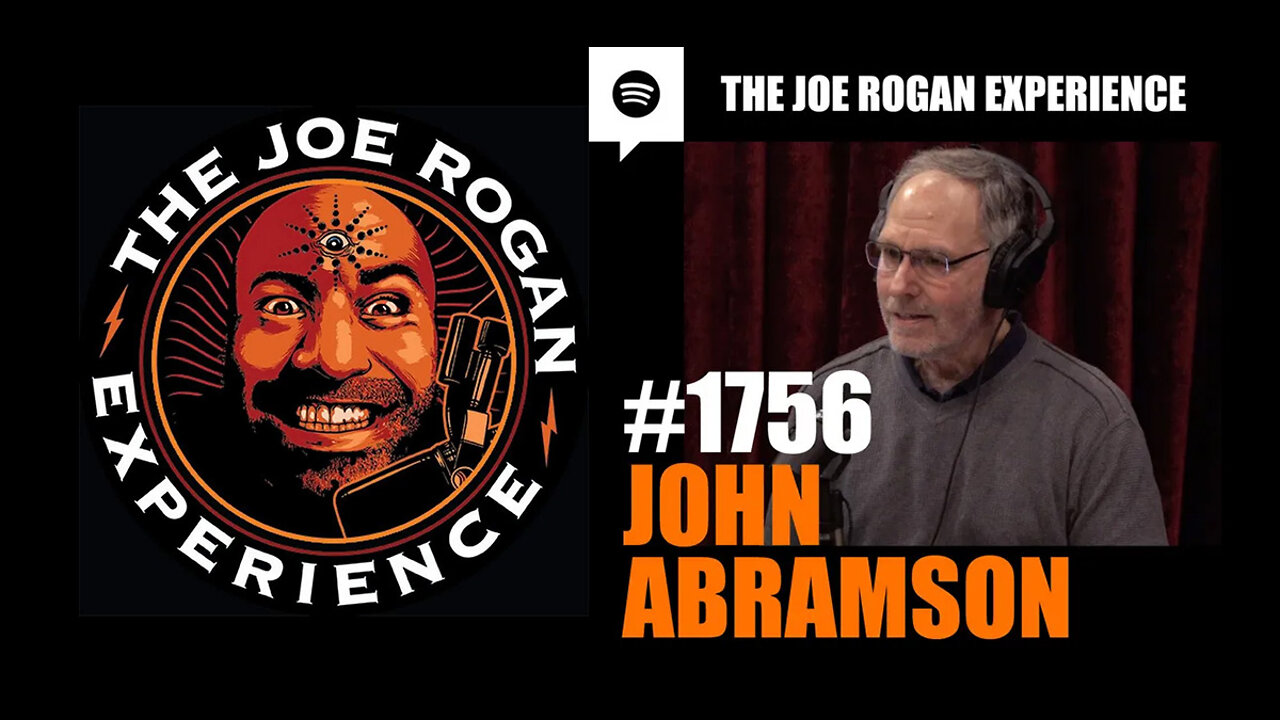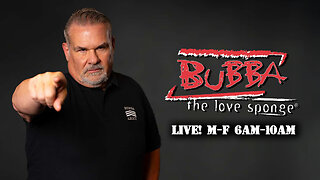Premium Only Content

Joe Rogan Interviews Dr. John Abramson (Sickening: How Big Pharma Broke American Healthcare...)
John Abramson, MD, is a Harvard Medical School Lecturer, national drug litigation expert, and author. His new book is called: "Sickening: How Big Pharma Broke American Health Care and How We Can Repair It."
Original Spotify Podcast:
https://open.spotify.com/episode/64ZsPU8e2CHvWQM9lqnLEY
See Also:
World Council For Health & Dr. Aseem Malhotra: All mRNA Vaccines Need To Be Immediately Suspended
https://rumble.com/v1lr5rz-world-council-for-health-and-dr.-aseem-malhotra-all-mrna-vaccines-need-to-b.html
Tucker Carlson: Drugs Are Not The Answer To Every Human Problem
https://rumble.com/v1dosyl-tucker-carlson-drugs-are-not-the-answer-to-every-human-problem.html
Russell Brand: Can We REALLY Trust Vaccine Fact-Checkers??!
https://rumble.com/vo0kjq-russell-brand-can-we-really-trust-vaccine-fact-checkers.html
...............
Joe Rogan Website:
https://www.joerogan.com/
Joe Rogan On Spotify:
https://open.spotify.com/show/4rOoJ6Egrf8K2IrywzwOMk
...............
Summary Of Joe Rogan Experience #1756 With John Abramson
For Those Who Do Not Have 2.5 Hours To Spend Watching The Podcast
By Sjoerd Bekius
January 3, 2022
https://sjoerd.substack.com/p/summary-of-jre-1756-with-john-abramson
Before you start reading…
After I did a summary of the Malone episode on the JRE, I found some people saying that the episode with John Abramson was even more important. You can understand my happiness when I found out this episode was half an hour shorter. That saves me about and hour haha.
MUST WATCH: Dr. Robert Malone On Joe Rogan - Complete 3-Hour Interview
https://rumble.com/vrvkpq-dr.-robert-malone-on-joe-rogan-complete-3-hour-interview.html
I have focused on the parts about the drug companies on some larger systemic points that were made. Other things, like ivermectin and hydroxychloroquine were also discussed, as well as things about his time as a family doctor. These things seemed less interesting to cover in these times.
Thank you for reading this summary. If it is useful to you, please consider subscribing to my Substack:
Podcast Summary
John Abramson wrote a book called "Sickening: How Big Pharma Broke American Healthcare, And How We Can Repair It."
The episode moves immediately to the question of why pharmaceutical companies can advertise in America. They can also do that in New Zealand, but the rules in New Zealand are much more strict. They have much more oversight about things like efficacy and pricing.
Abramson explains that the advertisement of medicine falls under the protection of free speech in America because they have, or can have, a beneficial effect. However, there is no law that says the ads cannot be misleading. This leads to a situation in which the ad does not really inform a person, but it manipulates people on an emotional level.
Abramson argues for advertisement laws that mandate certain information to be given in the ads so that it probably becomes less profitable for them to advertise.
Rogan remarks that the advertisements are emotional manipulation because they are selling this perfect life with people dancing in wheat fields. This leads people who are ill to believe they can be like that if only they take the medicine. Rogan thinks the ads should have no place anywhere.
Abramson thinks you will not get rid of ads, so he wants to reform the system. He would like to, but he thinks it is not going to happen. "The right to advertise is so baked into our Constitution."
"I think there are two important points to be made. One is … the primary function of the drug companies is to make money for their investors. And we've got to get over the illusion that somehow their purpose is to serve our health. Their purpose is to make money. And in our largely unregulated system, uniquely unregulated health-care system amongst developed countries, we allow the drug companies to control the information that flows to doctors and patients. And that's what has to change."
Rogan then moves to the Bextra case. This is the largest settlement Pfizer ever had to pay. It was $2.3 billion dollars. Abramson says he knows what Pfizer did wrong, but he can't tell because he signed a confidentiality agreement.
"Pfizer's behavior was in my opinion so outrageous, that I picked up the phone and called the Department of Justice, and said, I know a lot about this drug, but I can't tell you because I signed a confidentiality agreement as an expert."
He was then subpoenaed by the DOJ and the FBI and was asked to come and tell them what Pfizer did wrong.
"Six months later I read in the newspaper that the Department of Justice had found the company had committed a felony and they were dealt the largest fine in U.S. history."
"When a drug company sponsors a clinical trial, and they do the analysis and they write up a manuscript and they write up what happened and they send it to a medical journal and it gets peer-reviewed, and doctors are trained that they should trust peer-reviewed articles and that's how the system works. The peer-reviewers and the editors of the medical journals don't get to see the data. They have to take the word of the drug companies that they've presented the data accurately and reasonably completely. And you only get to see it in litigation, five years later."
Abramson explains that the pharmaceutical companies own the data. The control of the knowledge has been turned over to the drug companies. Outsiders cannot access raw data and have to trust the pharmaceutical companies to give them all the necessary data.
"They do what they can to exercise their fiduciary responsibility to their shareholders, which is to make this thing come out with data that's going to sell the drug. And then, after all of that, they own the data."
Another problem Abramson points out is that there is no limit on pricing. This is a perverse incentive that drives all kinds of profit-seeking behavior, because there is a lot of profit to be made. Also, there is no governmental, or quasi-governmental oversight that compares the value of new drugs, in terms of the therapeutic and the economic value, to older drugs.
"So we've created this situation where the prices are sky-high; where the knowledge is not being overseen and where the government is not allowing cost-effectiveness to get into our dialogue in the way it should be. We are essentially playing a professional basketball game where the players are calling their own fouls."
The conversation then moves to a drug called Vioxx that was produced by Merck. Merck has left out heart-attacks that occurred during the trials. Since the peer-reviewers could not access this data, they could only make sure articles about Vioxx made internal sense. Merck was fraudulent in hiding the data about the heart-attacks. In another study this risk became undeniable, and Merck had to pull it.
"20-25 million Americans had taken Vioxx, and between 40 and 60,000 Americans had died from the cardiovascular consequences of Vioxx. In the same ballpark as the number of Americans that died in Vietnam."
Merck was sued and had to pay $4.7 billion to plaintiffs, and just under a billion for a fine. Merck probably made around a billion dollars selling Vioxx after all the litigation. Nobody went to jail. Even though there was an email showing that scientists at Merck knew about the cardiovascular problems of Vioxx.
"It is very rare for somebody to go to jail. And even when they plead guilty … the Department of Justice allows a subsidiary of a parent company to take the hit so that if there is another flagrant foul, the subsidiary gets disbarred, excluded from the Medicare program. The parent company doesn't get the legal foul counted against them."
In the case of Neurontin, Pfizer misled doctors. They did a trial and the results showed that Neurontin did not work. Pfizer did their magic on the results, and changed the comparison in pain-levels between Neurontin and the placebo-group, to just looking at the pain level of the people who took Neurontin. And the pain level went down. But it went down in the placebo-group as well. They just showed the graph of the Neurontin group to doctors and claimed it was effective.
"It's like the drunk looking for his keys under the streetlight … that's where the money is. The money is in new therapeutics, so-called innovation. It's not in looking about which drugs make you healthier."
"61% of the FDA's budget for human products is paid for by the drug companies."
Abramson says that it is not difficult to understand that the drug companies have influence in the FDA. He cannot say the same about CDC.
Abramson says that pharmaceutical companies often represent the relative risk reduction as opposed to the absolute risk reduction. Here is how that works. Let's say you have a trial where 10,000 people take a drug (group A), and 10,000 people take a placebo (group B). If 1 person dies from group A, and two people die in group B, the relative risk reduction is 50%. However, the absolute risk-reduction is 1 in 10,000. That is 0,01%.
Abramson then notes the awful state of American health and healthcare in comparison to other wealthy countries. America actually pays more to healthcare, relative to GDP, than these other countries, but ranks way worse.
About the other countries, Abramson says:
"What they do is they oversee the integrity of the medical knowledge that reaches doctors. They can't control the journals, they can't control that problem with peer-reviewers not having the data, but they can do governmental, or quasi-governmental, what is called health technology assessment. Where they determine the medical value of new drugs and the economic value of new drugs … And they also control the price of drugs."
"With our allowing drugs to be 3,5 times more expensive than in the other developed countries, we are creating such an incentive to distort the medical knowledge. So we've got a Wild-West situation where the drug companies pay PR-people and lobbyists to create this illusion that their innovation is our only hope for a long and healthy life."
Rogan then asks why America is so much lower on the health metrics in comparison to other wealthy countries. Abramson mentions "diseases of despair." This is about non-college educated white Americans having an epidemic of drug overdose, suicides and alcohol abuse that has to do with their economic context. Their quality of life is going down and the expectations they had about their lives do not come true. This causes such diseases.
"My opinion on this is that since 1980 the United States has had a radical growth in economic inequality. Essentially, the share of the income pie has been so distorted to the wealthy, that it's like the average family living at the median income level at 55,000 dollars with 2,6 people in their household, if they were getting the same share of the income pie that they got in 1980 … they would have 20,000 dollars more per year."
Abramson links this economic inequality to a decay of America on the health metrics. The working people are getting a bad deal according to him and this is a major factor in their decay of health. He wants to go back to a "blue-collar aristocracy" where the working people were living a good life. Abramson says this was possible because of the balancing power of the government in the post-war years until Reagan.
In order to fix the issue in health-care, Abramson says that the people who are effected need to move in positions of power. These are doctors who are getting bad information, businesses who pay an enormous amount of money on health-care, and consumers/patients who want the best healthcare. However, before they can become useful politically, they need to understand how the system works.
Then Rogan talks about the opioid epidemic that was also gladly facilitated by pharmaceutical companies.
"We do such a poor job in the United States of preventing preventable disease. We are last amongst developed countries."
This partly has to do with diet. Abramson points to the level of obesity as a quick proof that something is not right in comparison to other wealthy countries. He then points out that he knows how the health industry is a bad influence on society, but that many more industries, like the food industry, are similar. The government needs to step up as a referee to protect the public from these industries.
Rogan then points out that the government would then also need oversight.
"We need to recreate the centre. With authority, so that you can't make a whole bunch of money selling fat food to poor people, and you can't make a whole bunch of money lying about your drugs and getting them covered by Medicare or private insurance."
"The divisions in this country are predictable, and it's because the centre doesn't hold."
Then the conversation moves to the "How We Can Repair It" part of the book.
Abramson says the people that are badly affected by the health-care system in its current state need to educate themselves on how the system works, and become politically active. He also states that consumers need to understand that 80% of their health has to do with their own choices. So, they have a lot of power in extracting themselves from the system for a large part. Also, businesses can come together to demand lower prices for drugs. That would benefit them because they would have to pay less on health-care costs for employees.
Rogan then asks how prices are decided upon. Abramson says that they will try to figure out how they can make as much money as possible. The formula is "price x volume." Lower the price, more volume, and vice versa. The goal is to find the sweet spot. Since most of the drug is paid for by insurance, it is a different kind of market. Pharmaceuticals are marketing their drugs to middle-men and give them kickbacks if they place their product more advantageously. The lack of a price ceiling leads to preposterous prices.
"Between two-thirds and three quarters of global pharmaceutical profits come from the United States."
At some point, the Democrats passed a Medicare negotiation bill meaning they would negotiate prices on the drugs with the highest revenue. About this Abramson said:
"The CBO said that that would cost 456 billion dollars in pharmaceutical profits over the next ten years. And the pharmaceutical companies went into this spasm of saying, 'this is gonna be a nuclear winter for drug innovation, and you're not gonna get the drugs that you need to be healthy.' Meanwhile, the drug companies, instead of 456 billion in ten years, had just spent 577 billion in cash buying back their own stock to jack up stock prices between 2016 and 2020."
"You don't need to know all these facts … What you do need to know is that the drug company is in the business of making money. And they do it very well. And they will continue to do it ever better, until they are stopped. And we might as well stop them sooner or later."
About the money made with the vaccines, Abramson says that Pfizer will make around 65 billion in two years. He also says, "They, and Moderna both declined to actively participate in creating the development of the capacity to manufacture drugs in underdeveloped countries."
The conversation then moves to insulin. There used to be treatment with animal insulin. Then it was figured out how to synthetically create human insulin. It was a pretty easy sell to get doctors to prescribe the human insulin over the animal one. However, there was no evidence that it was superior to animal insulin. It was merely more expensive and genetically engineered. Also, the price of this type of insulin could be controlled. This insulin cost around $21 per vial. In 1996 they came out with a new type of insulin that was only slightly changed. The manufacturers manipulated the standards that doctors were held to, and created an artificially tight control of insulin to lower the blood sugars beyond what medical science showed was beneficial. This then became standard care while it had no shown medical benefit. Then, an article was published that this new form of care actually caused more deaths, but nothing changed. These vials are much more expensive than $21. Meanwhile, nobody is exercising, a therapy that would be much more beneficial.
"What's really happening is that there is a nexus of influence … the drug companies are working with the the journals, and buying back reprints of the articles, and the journals part of the deal is not to ask for the data. And the academic medical centers are working with the drug companies and giving them more control than you would think academics would give to the private industry, because they're making money. The institutions are making money and the researchers are making money. The physicians societies, the professional organization are getting paid by drug companies … so that we've got this nexus of confluent interest that's feeding at the trough of drug company money. And that's called market failure. And market failure doesn't correct itself. You need government."
Abramson says that transparent data is needed. There is no reason for pharmaceuticals to be allowed not to share it. Then you need to go to the professional societies and tell them to stop taking drug company money.
Abramson then starts talking about Aduhelm. This is a drug for Alzheimer's disease that got approved a few months ago, even though the FDA voted 10 against, and 1 person abstained. It got approved anyway. The drug does not make a significant impact on clinical status, but it does have about a 33% incidence of brain side-effects. The story is still unfolding. There seemed to be some back-channel communication between FDA officials and Biogen executives, the manufacturer, and they came up with a scheme to get it accelerated approval. 3 people on the advisory committee of the FDA quit. The price of the drug is 58,000 dollar per year. Also, 60% of Americans believed the drug worked, even though it did not work.
The End.
Thank you for reading this summary. Please consider subscribing to my Substack if this was useful to you.
..............
Joe Rogan Interviews Aaron Rodgers About COVID-19 Vaccines (Excerpt)
https://rumble.com/v1hvg8d-joe-rogan-interviews-aaron-rodgers-about-covid-19-vaccines-excerpt.html
Joe Rogan Interviews Alex Berenson About All Things COVID (Full 3-Hour Interview)
https://rumble.com/v1hrjq1-joe-rogan-interviews-alex-berenson-about-all-things-covid-full-3-hour-inter.html
Alex Berenson On Joe Rogan: Twitter Ban Came From The White House
https://rumble.com/v1hlhsl-alex-berenson-on-joe-rogan-twitter-ban-came-from-the-white-house.html
Joe Rogan On Censorship, Discourse & Propoganda
https://rumble.com/v104zv8-joe-rogan-on-censorship-discourse-and-propoganda.html
Inspiring, Educational, Practical: Joe Rogan's Advice For How To Live A Good Life
https://rumble.com/vzusqu-inspiring-educational-practical-joe-rogans-advice-for-how-to-live-a-good-li.html
Joe Rogan Discovers 75% Of TV Advertising Is From Big Pharma!
https://rumble.com/vzocte-joe-rogan-discovers-75-of-tv-advertising-is-from-big-pharma.html
MUST WATCH: Joe Rogan Talks With Maajid Nawaz (Episode #1780)
https://rumble.com/vvexre-must-watch-joe-rogan-talks-with-maajid-nawaz-episode-1780.html
Joe Rogan Under Fire Because He Can't Be Controlled
https://rumble.com/vuqj0o-joe-rogan-under-fire-because-he-cant-be-controlled.html
Joe Rogan: Instead Of Silencing Me, You Need To Have Better Arguments
https://rumble.com/vuqgt8-joe-rogan-instead-of-silencing-me-you-need-to-have-better-arguments.html
Joe Rogan Offered $100M to Quit Spotify for Right-Wing Platform
https://www.hollywoodreporter.com/business/business-news/joe-rogan-quit-spotify-rumble-1235088127/
Joe Rogan Up Against ‘Powerful Interests,’ as More Musicians Threaten to Remove Music From Spotify
https://childrenshealthdefense.org/defender/joe-rogan-musicians-threaten-remove-music-spotify/
What Joe Rogan REALLY SAID (Minus The Diplomatic Spotify Apologies)
https://rumble.com/vtqg5i-what-joe-rogan-really-said-minus-the-diplomatic-spotify-apologies.html
Dr. Robert Malone On Joe Rogan
https://rumble.com/vrvkpq-dr.-robert-malone-on-joe-rogan-complete-3-hour-interview.html
Dr. Peter McCullough On Joe Rogan
https://rumble.com/vqsrv2-must-watch-dr.-peter-mccullough-talks-with-joe-rogan-about-covid-19.html
A Coordinated Disinformation Campaign To Discredit Ivermectin
https://rumble.com/vmfw28-a-coordinated-disinformation-campaign-to-discredit-ivermectin.html
Mainstream Media Caught Spreading Fake Ivermectin Overdose Story
https://rumble.com/vmi56p-mainstream-media-caught-spreading-fake-ivermectin-overdose-story.html
Some Of The Many Times CNN Accused Joe Rogan Of Taking Horse Dewormer (Ivermectin)
https://rumble.com/vnu33k-some-of-the-many-times-cnn-accused-joe-rogan-of-taking-horse-dewormer-iverm.html
Joe Rogan Grills Dr. Sanjay Gupta For CNN Calling His COVID Treatment "Horse Dewormer"
https://rumble.com/vnq1tk-joe-rogan-grills-dr.-sanjay-gupta-for-cnn-calling-his-covid-treatment-horse.html
Joe Rogan: “Do I Have To Sue CNN . . . They’re Making Shit Up!”
https://rumble.com/vm7xno-joe-rogan-do-i-have-to-sue-cnn-.-.-.-theyre-making-shit-up.html
Joe Rogan Makes Quick Recovery From Covid Using Monoclonal Antibodies, Ivermectin, Z-Pack...
https://rumble.com/vm0q5d-joe-rogan-makes-quick-recovery-from-covid-using-monoclonal-antibodies-iverm.html
Russell Brand - Joe Rogan & Ivermectin: Should Covid Be Politicised?
https://rumble.com/vme3dw-september-11-2021.html
-
 1:13
1:13
Sunfellow On COVID-19
2 days agoNicolas Hulscher: First Molecular Evidence Linking mRNA Shots To Genomic Integration In Cancer!
3.12K4 -
 LIVE
LIVE
Times Now World
1 hour agoLIVE News | “Diplomacy of Cannons Is Over” – Maduro Challenges Washington | Times Now World
5,003 watching -
 UPCOMING
UPCOMING
The Bubba Army
20 hours ago| Bubba the Love Sponge® Show | 9/02/2025
958 -
 LIVE
LIVE
FyrBorne
9 hours ago🔴Warzone M&K Sniping: I Can Be Your Idol (For Sniping)
641 watching -
 34:26
34:26
CarlCrusher
11 hours agoJake Paul's Crew vs Ancient Skinwalker Canyon
1612 -
 16:07
16:07
Chris From The 740
23 hours ago $0.04 earnedMy BIGGEST Problem with the Ruger RXM – FIXED by Liberty Build Co!
1061 -
 13:29
13:29
Professor Gerdes Explains 🇺🇦
10 hours agoUS Deploys Warships to Venezuela's Coast: A Show of Force Against Putin's Ally
6 -
 12:12
12:12
The Shannon Joy Show
12 hours ago🔥Carcinogens & Fetal Cells In Your New ‘Universal Vaccine’🔥
5422 -
 10:38
10:38
ariellescarcella
10 hours agoOnlyFans Models Fake Being Trans : Queer Activists Are PISSED
86 -
 8:00
8:00
Congressman Eli Crane
15 hours agoThe D.C. Crime Problem | Democrats' Greatest Lies – Vol.2
17.1K9